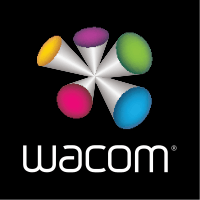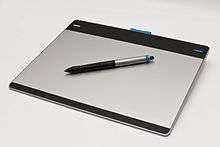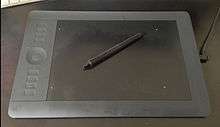Wacom (company)
 | |
|
Wacom headquarters in Kazo, Saitama, Japan | |
Native name | 株式会社ワコム |
|---|---|
| Public | |
| Traded as | TYO: 6727 |
| Industry | Computer input devices and software |
| Founded | Ageo, Saitama, Japan (July 12, 1983) |
| Headquarters | Kazo, Saitama, Japan |
Area served | Worldwide |
Key people |
Masahiko Yamada (President & CEO) |
| Products | Bamboo, Intuos, Cintiq, PenPartner, Volito, Graphire |
| Revenue |
|
|
| |
|
| |
| Total assets |
|
Number of employees |
Consolidated: 1,072 Non-consolidated: 474 (2015)[1] |
| Website |
wacom |
Wacom Co., Ltd. (株式会社ワコム Kabushiki-gaisha Wakomu) (/ˈwɑːkəm/) is a Japanese company headquartered in Kazo, Saitama, Japan, that specializes in graphics tablets and related products.
Headquarters locations
The American headquarters are located in the Pearl District of Portland, Oregon,[2] and those for Europe, Middle East, and Africa (EMEA) in Krefeld, Germany. Wacom is a Japanese portmanteau: Wa for "harmony", "circle" or "Japan" and Komu for "computer". Wacom tablets are notable for their use of a patented cordless, battery-free, and pressure-sensitive stylus or digital pen. In addition to manufacturing and selling tablets, Wacom also provides graphical input technology for some tablet computers, which it calls "Penabled Technology".
Functionality
Wacom tablet functionality was used in the screen of the Compaq Concerto computer in 1992, making it an early tablet computer.
Market share
| Year | Japan | Rest of the World |
|---|---|---|
| 2005 | 95.5%[3] | 70% |
| 2008 | 95.4%[4] | 86% |
| 2009 | 93.8%[5] | 85% |
| 2010 | 85.7%[6] | 85% |
| 2013 | 92.3% [7] | 80% |
Product lines
Wacom produces several tablet lines, three of which are marketed worldwide. Most are sold with a software bundle, such as ArtRage Lite, Corel Painter Essentials and Photoshop Elements, which take advantage of the tablet features. Each is sold with a compatible digital pen. Some pens feature buttons on the shaft or an "eraser" at the other end. Some models include a puck (mouse) based on the same technology. Software drivers for recent versions of Mac OS X and Microsoft Windows are included with most models. All current models of external tablets connect to computers via USB or Bluetooth.
Intuos

The Intuos line is aimed at home users.
2015 models† feature 1024 levels of pressure sensitivity and a resolution of 2540 lines per inch[8][9][10][11] (1000 lines/cm). Each of the models have a 5.8 × 3.6 in (14.7 × 9.2 cm) active surface area, a weight of 290 ±50g, and 4 control buttons.
Intuos tablets feature a battery-free pen (powered by the same EMR (Electromagnetic resonance) technology as the Intuos Pro line), which can be used alongside finger swipes (in some models), with ± 0.02 in (± 0.5 mm) accuracy. Each tablet includes an option to switch orientation for left- or right-handed users.
In the Americas and Europe, four models are† available in 2015: Intuos Draw, Intuos Art, Intuos Photo, and Intuos Comic.[12] In addition to stylus-based input, each model features multi-touch functionality, with support for one- and two-finger gestures for such operations as scrolling and zooming.
Accessories
Wacom's Wireless Accessory Kit is a USB dongle and adapter which allows all Intuos tablet Models connect to a computer wirelessly. This kit is compatible with certain models. It did not work with the 2011 Bamboo Splash, Bamboo Connect or Bamboo Pen models.[13] This kit was also not compatible with older models, as the USB connection cable was hardwired to the tablet. The newer models feature a removable USB cable.
Intuos models
| Tablet model number | Product name | In production | Multi-touch | No. control buttons | Physical dimensions | Active surface area | Color(s) | Bundled software | |
|---|---|---|---|---|---|---|---|---|---|
| Millimeters | Millimeters | Inches | |||||||
| PTH-651/S | Intuos Pro SE | Yes | Yes | 8 + 4 (Touch Ring) | 380 x 251 x 12 | 224 x 140 | 8.8 x 5.5 | Silver and Black | - |
| PTH-851 | Intuos Pro large | Yes | Yes | 8 + 4 (Touch Ring) | 487 x 318 x 12 | 325 x 203 (Pen)
299 x 190 (Touch) |
12.8 x 8.0 (Pen)
11.8 x 7.5 (Touch) |
Black | - |
| PTH-651 | Intuos Pro medium | Yes | Yes | 8 + 4 (Touch Ring) | 380 x 251 x 12 | 224 x 140 | 8.8 x 5.5 | Black | - |
| PTH-451 | Intuos Pro small | Yes | Yes | 6 + 4 (Touch Ring) | 320 x 208 x 12 | 157 x 98 | 6.2 x 3.9 | Black | - |
| CTL490DW
CTL490DB |
Intuos Draw | Yes | No | 4 | 152 x 95 | 6.0 x 3.7 | White
Mint Blue |
ArtRage Lite | |
| CTH490AK (Black)
CTH490AB (Blue) |
Intuos Art (small) | Yes | Yes | 4 | 152 x 95 | 6.0 x 3.7 | Black
Mint Blue |
Corel Painter Essentials | |
| CTH690AK (Black)
CTH690AB (Blue) |
Intuos Art (medium) | Yes | Yes | 4 | |||||
| CTH490PK | Intuos Photo | Yes | Yes | 4 | 152 x 95 | 6.0 x 3.7 | Black | Paint Shop Pro X8 (Win), Macphun Creative Kit (Mac), Corel Aftershot Pro 2 (Win & Mac) | |
| CTH490CK
CTH490CB |
Intuos Comic | Yes | Yes | 4 | 152 x 95 | 6.0 x 3.7 | Black
Mint Blue |
Clip Studio Paint Pro, Smith Micro Anime Studio | |
| CTH300K
CTH300B CTH300E CTH300U |
Bamboo Pad Wireless | Yes | Yes | 0 | 141.4 x 166.5 x 4.5–15.7 | Silver/Black
Pearl White/Blue Pearl White/Green Pearl White/Purple |
Bamboo Page | ||
| CTH300K | Bamboo Pad USB | Yes | Yes | Silver/Black | |||||
| Tablet model number | Name | In production† | Multi-touch | No. control buttons | Physical dimensions | Active surface area | Color(s) | Bundled software | |||
|---|---|---|---|---|---|---|---|---|---|---|---|
| Americas | Europe | Millimeters | Millimeters | Inches | Americas | Europe | |||||
| CTL490DW (White)
CTL490DB (Blue) |
Intuos Draw[14] | Intuos Draw[15] | Yes | Yes | 4 | 210 x 169 x 11mm | 216 × 137[16] | 5.8 × 3.6 in | White,Blue |
|
|
Small: CTH490AK(Black) CTH490AB(Blue) Medium: CTH690AK(Black) CTH690AB (Blue) |
Intuos Art[17] | N/A | Yes | No | 0 | 278 × 176 × 11[18] | 147 × 92 | 5.8 × 3.6 |
|
N/A | |
| CTH490PK (Black) | Intuos Photo[19] | Intuos Photo[20] | Yes | No |
|
||||||
| MTE-450 | Bamboo[22] | No | No | 4 + navigational touchpad | 200 x 186[22] | 147.6 × 92.3[22] | 5.8 × 3.6 | Charcoal/black | ? | ||
| CTF-430 | ? | One | No | No | 0 | 195 × 195 × 10 | 128 × 93 | 5 × 3.6 | Silver/grey | N/A |
|
^† As of November 18, 2012
Intuos Pro

Intuos Pro is marketed to professional graphic artists and featured the highest specifications of any non-screen Wacom device.[23] The Intuos Pro is available in multiple sizes and proportions and includes 60 degrees of tilt sensitivity (50 degrees in the small model) and 2048 pressure levels. It also touch controls on the drawing surface, allowing the user to manipulate the canvas with multi-touch gestures. The Intuos line offered 2000 lines per cm (5080 lines per inch) resolution and came in multiple sizes (active area):
- Small: 157.5 mm × 98.4 mm; 6.2 in × 3.9 in
- Medium: 223.5 mm × 139.7 mm; 8.8 in × 5.5 in
- Large: 325.1 mm × 203.2 mm; 12.8 in × 8.0 in
Each Intuos5 model could be made wireless using the Wireless Accessory Kit.
A larger version of the previous generation of Intuos, the Intuos4 Extra Large (XL) was still manufactured in 2011 and marketed to artists who needed a larger working area. The Intuos4 XL had a 462 mm × 304.8 mm; (18.2 in × 12.0 in) working area and offered 2048 pressure levels pressure 50% tilt sensitivity. However, the Intuos4 lacked touch-based input, instead requiring a stylus or a compatible mouse.
Cintiq
The Cintiq is a tablet/screen hybrid, a graphics tablet that incorporates an LCD into the digitizing tablet itself, allowing the user to draw directly on the display surface. The tablets are available in several sizes.
A 21-inch 1600×1200 resolution tablet, the 21UX, was available for several years (up to 2011) at various price points. As of November 2007, both a 12-inch and a 20-inch widescreen model were released, the 12WX and the 20WSX, respectively. All three models use Intuos3 pens with 1024 pressure levels.
In 2010, the 21UX saw a major design revision and a price drop. It offered a higher pen resolution and 2048 pressure levels due to Wacom's integration of Intuos4 technology. The 21UX's sensitivity was much greater than most tablet computers and portable computers offering similar functionality on built-in screens. In addition, the 21UX included an integrated stand that allowed the user to tilt and rotate the unit.
On September 13, 2011, Wacom announced its newest and largest Cintiq, the 24HD (DTK-2400). It contained a 24-inch 1920×1200 resolution LCD with 92% coverage of the Adobe RGB color gamut (versus 72% in the 21UX). The pen technology, like the 21UX, was identical to the Intuos4 in resolution per inch and sensitivity. This model included an integrated adjustable-tilt stand that allowed it to hang off the edge of the table and closer to the user.
Cintiq Companion
The Cintiq Companion is essentially a mobile version of the Cintiq 13HD model, combining the tablet/screen hybrid with an Android tablet (Cintiq Companion Hybrid) or a Windows 8 tablet PC (Cintiq Companion). Although not as costly as the high-end Cintiq tablet (namely Cintiq 24HD Touch), the Cintiq Companion was priced over its standalone Cintiq 13HD counterparts.
Each Cintiq Companion model features 2048 pressure levels with multi-touch control, 1,920-by-1,080 resolution, an express key located on the left of the tablet that could be customized, palm rejection, a silky matte finish, a stand that allows the user to tilt the unit to three different degrees and weighed about 3.9 pounds.[24]
Besides the operating system, the main difference between the Android and the PC model is the storage, with the former at 16/32GB, while the latter uses a 256/512GB SSD.
The Cintiq Companion 2, unveiled at the Consumer Electronics Show in 2015, boasts newer Intel CPUs and a higher resolution display of QHD or 2560-by-1440.
Inkling
Inkling,[25] announced on August 30, 2011, enables artists to draw sketches on paper that could be converted into digital images. Inkling consists of a receiver, into which artists insert any kind of paper, and a special pen which uses real ink. As the user draws on paper, new layers can be added by tapping a button on the receiver. When the artist finishes a sketch, he or she can connect the receiver into a USB port, where the sketches are imported into Sketch Manager and can be exported to Photoshop, Illustrator or Autodesk Sketchbook Pro, as well as various image formats. As of 2013, the device was priced US$99/€74.
Other lines
Wacom offers additional products which it marketed in various parts of the world. The Graphire Wireless is a 6 in × 8 in (15 cm × 20 cm) version of Wacom's discontinued Graphire line (largely replaced by the Bamboo) which communicates with the computer via Bluetooth rather than a USB cable. The Graphire digital pen is interchangeable with the original Bamboo model's digital pen but not later Bamboos. In Europe, Wacom offered the Colorelli, a tablet and software package marketed as a creative outlet for children; "JustWrite Office" a basic tablet for capturing written input in office applications; the PL Series, similar in function to the Cintiq but with more modest specifications suited for office use; and the "Signature Tablet", a monochrome display/tablet for capturing signatures.
Using its touch-interface expertise, Wacom also produced a DJ Controller called the Nextbeat X-1000 from April 2010.[26]
Discontinued
Discontinued products from Wacom included the ArtZ, ArtZ II, ArtPad, ArtPad II, all Bamboo Products, Digitizer, Digitizer II, Favo, UltraPad, Graphire through Graphire4, Intuos through Intuos5, 15-, 17- and 18-inch Cintiqs, Volito, and PenPartner. Early models used RS-232 and Apple serial connectors, with a conversion to USB in later models.
Durability
Several Wacom models, including the Intuos4 and Bamboo, were criticized for the drawing surface's roughness, which caused the small pressure-sensitive 'nib' to wear down, and become slanted or scratchy in the same way as pencil lead, albeit more slowly. This could also cause the surface to become smoother where it is used more, resulting in uneven slick and non-slick areas. As the nibs were only short lengths of plastic, it was possible for a user wanting a more durable nib to improvise a replacement from a short length of nylon 'wire' (approx 0.065 inches or 1.7mm diameter) like that found in grass trimmer or 'weed-eater' refills, suitably straightened by hand and smoothed (rounded off) at one end with abrasive paper. Additionally, a thin sheet of glass or acetate can be placed over the drawing surface to avert surface or nib damage in the same way as screen protectors are used on phones, although in the case of glass this may induce a—usually modest—parallax error when tracing.[27][28][29][30][31][32][33]
The Intuos4 surface sheet was revised in October 2010 to reduce nib wear. Wacom Europe sells a bundle that includes the revised surface sheet and replacement nibs at a reduced price for installation in existing Intuos4 tablets.[34]
Drivers
Wacom supplied drivers for many versions of Microsoft Windows and Mac OS. The driver package included a control panel which allowed extensive customization of the tablet and pen. Drivers for some older models of Wacom tablets with serial connections were written for the Atari ST/TT computers and are available from the European Wacom ftp server for download. Other legacy OS drivers available include OS/2 and SunOS.
The Linux Wacom Project produced drivers for Linux/X11. According to Peter Hutterer in his XDC2016 talk, Wacom has 3 Linux kernel developers (Ping Cheng, Jason Gerecke and Aaron Skomra) working full-time on Linux support.[35] As for widget toolkits, the support of GTK+ 3.22 for graphics tablets is considered to be feature complete.
ThinkyHead Software published the free TabletMagic[36] driver package. TabletMagic is a driver for discontinued serial-port Wacom tablets for use on modern Apple Macintosh computers under the Mac OS X operating system. A USB-to-serial port adapter is required. (OS X open source drivers for many such adapters are available from Source Forge.)[37] Not all original functions of the tablet are supported by TabletMagic, but most basic functions are retained.
Technology
Wacom tablets use electromagnetic resonance technology.[38] Since the tablet provides power to the pen through resonant inductive coupling, no power is required for the pointing device. As a result, no batteries are inside the pen (or the accompanying puck), making them lighter and slimmer.
Under the tablet's surface (or LCD in the case of the Cintiq) is a printed circuit board with a grid of multiple send/receive coils and a magnetic reflector attached behind the grid. In send mode, the tablet generates a close-coupled electromagnetic field (also known as a B-field) at a frequency of 531 kHz. This close-coupled field stimulates oscillation in the pen's coil/capacitor (LC) circuit when brought into range of the B-field. Any excess resonant electromagnetic energy is reflected back to the tablet. In receive mode, the energy of the resonant circuit’s oscillations in the pen is detected by the tablet's grid. This information is analyzed by the computer to determine the pen's position, by interpolation and Fourier analysis of the signal intensity. In addition, the pen communicates information such as pen tip pressure, side-switch status, tip vs. eraser orientation and ID number (to differentiate between different pens, mice, etc.). For example, applying more or less pressure to the tip of the pen changes the value of the pen's timing circuit capacitor. This signal change can be communicated in an analog or digital method. An analog implementation modulates the phase angle of the resonant frequency, while a digital method is communicated to a modulator that distributes the information digitally. The tablet forwards this and other relevant tool information in packets, up to 200 times per second, to the computer.
References
- 1 2 3 4 5 "Annual Report 2015" (PDF). Wacom. Retrieved October 10, 2015.
- ↑ Rogoway, Mike (March 12, 2015). "Wacom joins tech stampede to Portland, moving office from Vancouver and adding dozens of jobs". The Oregonian. Retrieved April 9, 2016.
- ↑ "FAQs". Wacom. Archived from the original on 2007-10-05. Retrieved 2008-02-16.
- ↑ "FAQs". Wacom. Retrieved 2009-08-14.
- ↑ "FAQs". Wacom. Retrieved 2010-07-10.
- ↑ "FAQs". Wacom. Retrieved 2011-08-06.
- ↑ "Annual Report 2013" (PDF). Wacom. Retrieved July 1, 2014.
- ↑ "Bamboo Create". Wacom. Retrieved October 6, 2011.
- ↑ "Bamboo Connect". Wacom. Retrieved October 6, 2011.
- ↑ "Bamboo Capture". Wacom. Retrieved October 6, 2011.
- ↑ "Compare Bamboo tablets". Wacom Europe GmbH. Retrieved October 6, 2011.
- ↑ "Intuos". Wacom. Retrieved September 7, 2015.
- ↑ "Wireless Accessory Kit for Bamboo & Intuos5 | Wacom eStore - official Onlinestore". Eu.shop.wacom.eu. Retrieved 2013-11-13.
- ↑ "Error - Wacom". wacom.com.
- ↑ Bamboo Fun M Pen & Touch Write a review All languages. "Bamboo Fun M Pen & Touch | Wacom eStore - official Onlinestore". Uk.shop.wacom.eu. Retrieved 2013-11-13.
- ↑ "Bamboo Fun M Pen & Touch | Bamboo | Products | Wacom eStore". Wacom European store. Retrieved November 17, 2012.
- ↑ "Intuos Art - Wacom". Wacom.
- ↑ "Wacom Bamboo Pen & Touch Graphics Tablet Peripheral review - Trusted Reviews". Trusted Reviews. January 23, 2009. Retrieved October 6, 2011.
- ↑ "Intuous: Wacom". Wacom.
- ↑ "Intuous: Wacom". Wacom. Archived from the original on November 29, 2012. Retrieved November 18, 2012.
- 1 2 Wacom Europe GmbH. "Wacom Europe GmbH - Products - Bamboo - Bamboo Tablets". Wacom.eu. Retrieved 2013-11-13.
- 1 2 3 Bray, Jonathan (2011-02-05). "Wacom Bamboo Graphics Tablet review - Peripheral". Trusted Reviews. Retrieved 2013-11-13.
- ↑ "Choosing the best Wacom tablet, Part 1: Intuos graphics tablets". www.tabletsforartists.com. Retrieved 2016-03-22.
- ↑ Brian Westover (2013-12-02). "Wacom Cintiq Companion". PCMAG. Retrieved 2015-01-02.
- ↑ "Wacom Inkling - The designers tool on the go". wacom.eu.
- ↑ Future Music. "Wacom Nextbeat | Tech Reviews". MusicRadar. Retrieved 2013-11-13.
- ↑ "Wacom Forum - Wacom Europe GmbH • View topic - Intuos4 nibs flattening quickly". Forum.wacom.eu. Retrieved 2010-07-10.
- ↑ "ImagineFX - Wacom nibs". Community.imaginefx.com. Retrieved 2010-07-10.
- ↑ "Sijun Forums :: View topic - Wacom Tablets". Forums.sijun.com. Retrieved 2010-07-10.
- ↑ "deviantART Forum: wacom bamboo pen nibs". Forum.deviantart.com. Retrieved 2010-07-10.
- ↑ "How long should a Wacom Intuos3 pen nib last? - GFXartist.com - Served over 20,000,000 artworks". GFXartist.com. Retrieved 2010-07-10.
- ↑ "Wacom Bamboo Owners: How's Your Nib?". Graphicssoft.about.com. Retrieved 2010-07-10.
- ↑ "Intuos4 vs Intuos3 nib question - ConceptArt.org Forums". Conceptart.org. Retrieved 2010-07-10.
- ↑ "Wacom eStore".
- ↑ https://www.x.org/wiki/Events/XDC2016/Program/hutterer_input/
- ↑ "TabletMagic". Thinkyhead Software.
- ↑ b_j_arnoldus. "PL2303 USB to Serial Driver for Mac OS X". SourceForge.
- ↑ "United States (expired) Patent US4878553 describing the technology" (PDF). Freepatentsonline.com. Retrieved 2011-10-06.
